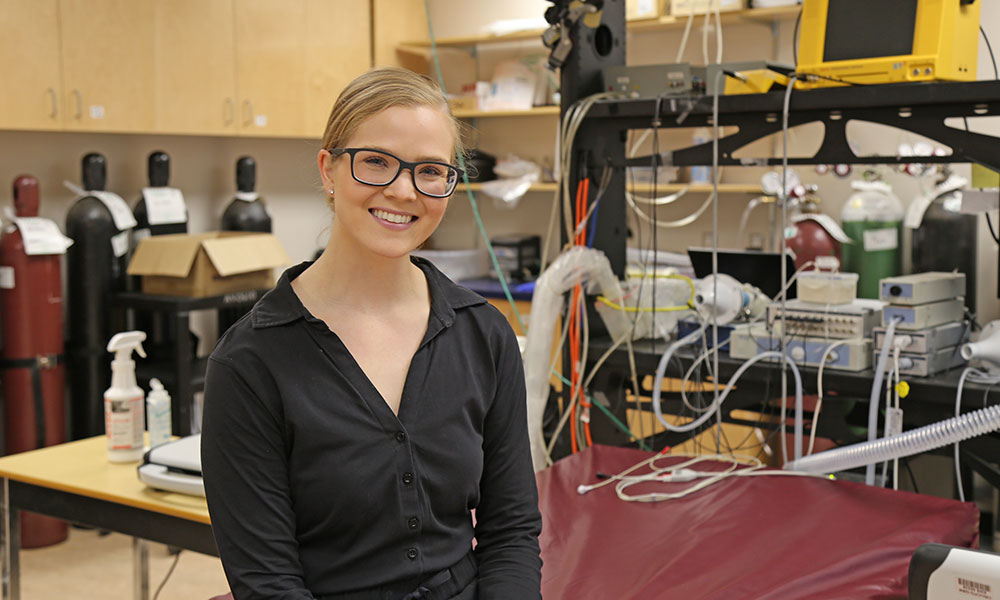Alumni Spotlight, People, Student Profile
Going the Distance
June 23, 2021

About
Name
Hannah Caldwell
Role
Doctoral student
Alumna
Program
Human Kinetics
School
Health and Exercise Sciences
Faculty
Health and Social Development
Campus
Okanagan (Kelowna, BC)
Education
Master of Science, UBC Okanagan
Bachelor of Human Kinetics, UBC Okanagan
Hometown
Kelowna, BC
“It’s a privilege to be a member of a research centre that connects an international network of trainees, colleagues and clinicians around the world.”
HANNAH CALDWELL IS GOING TO GREAT DISTANCES to master her field. The aspiring scholar has travelled to seven field locations across the world to advance her research in how the human body adapts to environmental stress.
Her passion for exploring the relationship between environmental stress and the human body first began as an undergraduate student in the Bachelor of Human Kinetics program. Inspired by her curiosity to better understand how the body reacts to aerobic exercise under stress, Caldwell applied for a summer research position at the Centre for Heart, Lung & Vascular Health (CHLVH).
“I immediately loved the team dynamic of this revolutionary group of students, and I wanted to be part of it,” says the soon-to-be Dr. Caldwell.
At the CHLVH, Caldwell’s curiosity quickly developed into the aspiration to pursue her own research program — first as a master’s student and now as a doctoral student in the School of Health and Exercise Sciences.
“I was driven to improve our understanding of brain and skeletal muscle blood flow regulation during exercise in healthy and clinical populations,” Caldwell explains. She hopes to one day apply her work as a therapeutic tool for conditions such as Type 2 diabetes and peripheral artery disease.
When the brain and other organs are deprived of oxygen or blood, a person may become ill, suffer permanent damage or even die. By characterizing and optimizing blood flow to the brain and skeletal muscles, Caldwell hopes to marry two of her passions: high-performance sport and extreme environmental physiology. “I believe in an ‘exercise is medicine’ approach,” she adds.
While there’s no doubt about the positive impacts of exercise, Caldwell’s work specifically examines how environmental stress — like extreme temperatures or high or low altitudes — affects blood flow regulation and oxygen delivery to key organs such as the brain, heart and muscles.
“My hope is that my research will improve the therapeutic application of exercise in both disease and high-performance sport.”
BREATHTAKING LOCATIONS
When Caldwell joined the CHLVH team, she became a member of a thriving network of world-class researchers.
Throughout her three degrees at UBC Okanagan, Caldwell has also had the privilege of conducting field studies from Denmark to Dubai, including working with elite breath-hold divers in Cavtat and Split, Croatia. She credits her supervisor, Dr. Phil Ainslie, with providing consistent support and making it all possible.
“Phil inspires all of his trainees to be excited about research,” she says. “When you meet Phil, you would have no idea he’s a world-renowned Canada Research Chair in Cerebrovascular Physiology, and I think his kindness and humbleness is what inspires each and every one of us to push our boundaries.”

Hannah Caldwell in Cavtat, Croatia.
TEAMWORK IS KEY
“Growing up I was always very active and loved participating in team sports,” says Caldwell of her background in competitive soccer. She considers the CHLVH a similar type of team; since her research interests involve integrative physiology, or examining multi-organ systems, Caldwell often needs to lean on the expertise and teamwork from many colleagues and physicians.
“Without the team that Dr. Ainslie has built I don’t think any of my work would be possible,” she adds.
Since joining the CHLVH in 2017, Caldwell says she’s most grateful for the opportunity to build personal and professional relationships. “Dr. Ainslie has this addictive enthusiasm and work ethic, and everyone on his team is motivated to support one another.”
TOP IN HER GAME
Caldwell herself exudes the same humbleness as her supervisor. This year, she was awarded the prestigious Friedman Award for Scholars in Health, which recognizes outstanding graduate students working to bring new perspectives to their work.

With the award, Caldwell is off to yet another international location: Copenhagen, Denmark. There she’ll work with professors Dr. Ylva Hellsten and Dr. Lasse Gliemann in the Cardiovascular Research Group within the integrative physiology section at the University of Copenhagen.
“It’s a dream come true for me,” says Caldwell of the opportunity to work with scholars she has long-admired at the world-renowned Department of Nutrition, Exercise and Sports. In fact, the department’s sports science research environment has been ranked top in the world for five years according to the influential Shanghai Ranking (Academic Ranking of World Universities).
Caldwell will stay in Copenhagen for 12 months to learn advanced techniques and methods to conduct measurements on the cardiovascular system, skeletal muscles and the brain. She will also work to develop a strong understanding of these techniques, with the aim of applying them to research underway at UBC Okanagan. And, like everything in the CHLVH, the aim is to improve the team.
“The ability to integrate the methods currently being used by the University of Copenhagen into our existing laboratory work is an exciting next step. Our team will have a few more tools in the toolkit.”